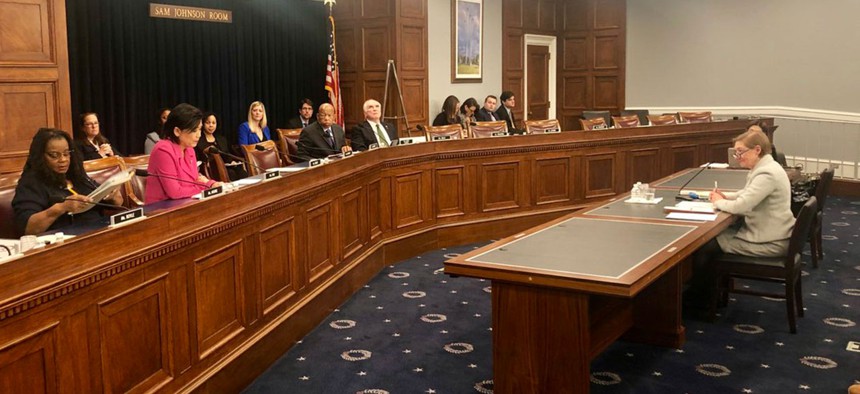
Taxpayer Advocate Nina Olson testifies before lawmakers Thursday. Office of Rep. Judy Chu
Taxpayer Advocate: IRS Will Need 12-18 Months to Recover From Shutdown
Retiring Olson makes valedictory plea for more funding.
The Internal Revenue Service is “at a point where it is stretched too thin, and things could go badly wrong—or taxpayers will give up trying to reach the IRS and not receive the help they need.”
So said National Taxpayer Advocate Nina Olson at a House Ways and Means Oversight Subcommittee hearing, during which she was praised for her 18 years of ombudsman work that will end when she retires on July 31.
Preliminary data on the four-week-old 2019 filing season show that taxpayer assistance telephone lines properly routed only 57 percent of millions of phone calls received, with assistors providing answers to only 18 percent, Olson said. These figures are “both substantially down from last year’s levels,” she testified.
During the first week after the Dec. 22-Jan.25 partial government shutdown, the agency’s phone line for taxpayers who wish to negotiate payment of taxes owed routed inquiries correctly at only a 6.7 percent rate, “meaning 93.3 percent of the calls from taxpayers trying to make payment arrangements were not answered,” Olson said.
“By Jan. 24, 2019, the final day of the shutdown, the IRS had over 5 million pieces of unprocessed mail, 80,000 responses to fiscal year 2018 earned income tax credit audits that had not been addressed, and 87,000 amended returns waiting to be processed,” she said.
“When we can’t process correspondence, that drives people to call us more,” she said, “so the endless cycle goes on.” While the agency has gained efficiencies from more taxpayer use of online tools, “the only way to solve it is to have more employees working those calls and answering correspondence,” she said.
Having released what will be her final annual report on Feb. 13, Olson—who was among the employees “excepted” during the shutdown—said she was in contact with other non-furloughed agency officials daily during the lapse. The IRS anticipates that it will take 12-18 months to catch up from the lost work, she said, with effects spilling into the next filing season.
Olson contradicted Republicans who have touted the 2017 Tax Cuts and Jobs Act for simplifying the tax return process via “post-card-size” redesigned 1040 forms. “For taxpayers with simple returns, the shorter form should provide simplification,” Olson said. “But for the majority of taxpayers who will have to complete additional schedules, the new form is likely to create more complexity.”
There is also a reported rise in errors on submitted tax returns, a situation, Olson said, she is “watching like a hawk.”
The taxpayer advocate praised the IRS for its efforts at combatting identity theft and fraudulent refund claims by criminals using information obtained by cyber hackers. “The IRS does an incredible job protecting taxpayers,” she said. “Identity theft has been going on for 20 years,” the challenge for the agency being that the hackers get their information from other entities. “The phishing companies get full W-2 form sets, and once they have that, it becomes difficult for the IRS to tell whether you are a legitimate person.”
The perennial issue of how the IRS can modernize its decades-old computer system was raised by Rep. Jackie Walorski, R-Ind. In the previous Congress, “we found that much of the waste was not the result of budget limitations, but mismanagement and poor administration,” Walorski said, calling on the IRS to prioritize better and cease procurements that are boondoggles. “It should spend what it already has before we give it new money,” she added.
Olson agreed partially. Yes, the tax agency managers should be “honest about their challenges and not whitewash them,” she said. And procurement problems back in the 1990s were a key reason for waste.
The agency “needs accountability and transparency, but I do think it needs more money,” though not “a blank check,” she added. Olson called for “dedicated funding for a big leap to replace its core system records of taxpayer accounts” that still uses systems that go back to the 1960s. Currently “no one has a 360-degree view” of different taxpayer records, and too much “custom programming” means money goes “down a sinkhole,” she said.
Ranking subcommittee member Mike Kelly, R-Pa., asked Olson for support of reviving the Republicans’ “Taxpayer First Act,” which came close to passing with bipartisan support in the last Congress, and would reorganize the agency to put focus “back on customer service,” Kelly said.
Olson agreed. “The IRS still views itself as an enforcement agency, and I feel you shouldn’t have that break between service and enforcement,” she said. “Restructuring the IRS would reinforce that message.”
Kelly praised Olson as Congress’s “boots on the ground,” saying she “never stopped working for the American people.”
Subcommittee Chairman John Lewis, D-Ga., on addressing Olson’s coming retirement, said, “Say it isn’t so! You’ve been so helpful over the years to this committee, to Congress, to the American people. You’ve been like a rock, a person sailing against the wind.”







